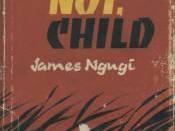Throughout the novel "Weep Not, Child" by Ngugi Thiong'o, hope is a persistent theme, often referred to symbolically through light. The novel begins with a hopeful start but as it progresses, there is a gradual loss of hope. In chapter 11 Njoroge confidently says that "sunshine always follows a dark night. We sleep knowing and trusting that the sun will rise tomorrow." expressing his hopefulness that his country's situation will improve. I disagree with this statement, as I believe that this book does not reveal a hopeful message.
Njoroge had faith in his education and his belief in religion motivated him throughout the beginnings of the novel. These are one of the largest sources of hope demonstrated in the story. However, I do not believe that his education exhibits a message of hope. He had hopes that education would allow him to excel and somehow save his country in the future.
As a reader we can tell that Njoroge's hopes in education are all concerning the future and are rather naïve. There is no explanation on how education would improve his country in the future. Njoroge's belief in the future was always his main hope and his form of escaping from the present, which is supported when Njoroge is speaking to Mwihaki about the future and the narrator says, "Njoroge still believed in the future. Hope of a better day was the only comfort he could give to a weeping child. He did not know that his faith in the future could be a form of escaping from the reality of the present." By the end of the novel Njoroge's hope in education is completely shattered; Gikuyu schools are shut down by the government and he was taken away from school by two officers and was later tortured.


